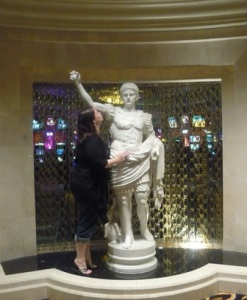March 15. The infamous Ides of March when Brutus murdered Caesar. The day known for betrayal. Yes, I read the play in high school (yeah I also saw the George Clooney/Ryan Gosling movie too). Despite the warnings that Shakespeare provided, I have always been a overly trusting, both personally and professionally. I’m not naive, mind you, I just give people the benefit of the doubt. Unfortunately, I have been the victim of deception on more than one occasion. I have believed people to be something that they are not and have, at times, been hurt. That said, I truly believe in being true and honest, regardless of how others behave. My online personality is indicative of the person who you would meet face-to-face.
There is a huge correlation to who you are in social media and how it translates it the real world. For both individuals and companies, it is crucial to honor your online persona and have it translate to the same quality in person. It’s also important for brands to represent themselves on social media in the same they would in any other medium. If a company has a strong reputation for customer service, yet ignores serving customers via social networks, their brand may be tarnished and trust may be lost.
Many people spend time on social media wishing people well, promoting others, offering support, cheering people on and building friendships. However, if this is not a true representation of who you are and how you really feel, is it appropriate to behave this way online? Social media provides efficiency and allows us to reach a greater number of people with our message. It allows people to make friends with others who the may never have encountered otherwise. It allows us to be kind and spend time making other people feel good about themselves because of our expanded reach. But what happens when you have an offline encounter with a person or organization and they don’t match up to who you believed them to be? What if they are not as kind, open, complimentary, knowledgeable, etc.? Do you feel betrayed? Would you still conduct business with them or would you hold them accountable for their “deceit.”
Perhaps I am being extreme. Many people are better able to express themselves in writing and find it easier to build relationships using technology. Many people intend to be sincere and any deviation from their online brand is unintentional.
So how can you avoid being a “Brutus?” How can you present yourself or your brand using social media so that you are being true to yourself. How do you keep the same personality online and offline and does it matter?
Did you think I was going to give you the answers? I think the starting point is to ask yourself these questions and they will lead you down the right path. By simply acknowledging that it might matter and that there might be a difference can help you to be a better person/company online and in real-life.

